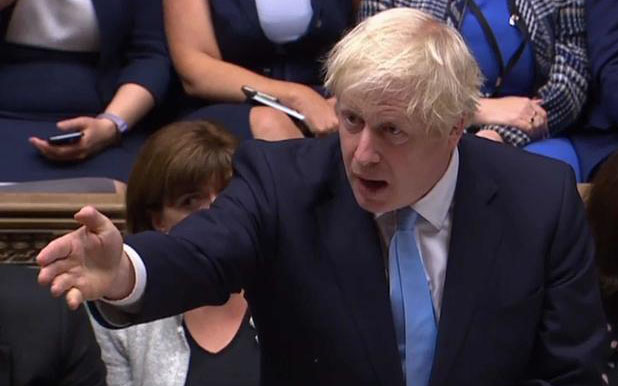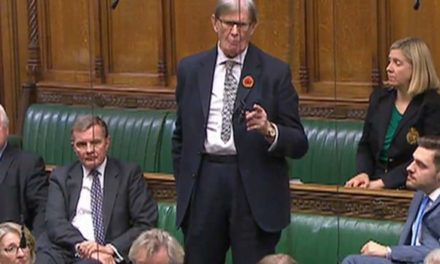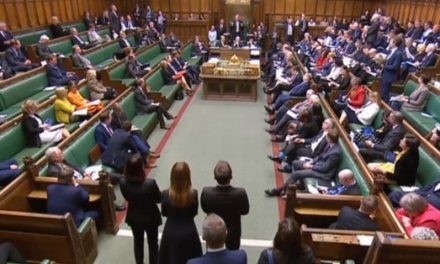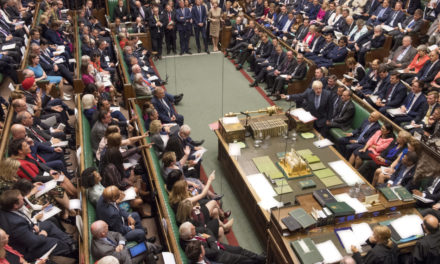Boris Johnson’s motion to call for an early general election has failed again to reach the required threshold of two-thirds of MPs (434). During the debate Sir William Cash made the following speech:
The Prime Minister (Boris Johnson): I beg to move,
That there shall be an early parliamentary general election.
Before I begin, Mr Speaker, I join others hon. Members in thanking you for your long and distinguished service to the House. We may not have always agreed on everything, but I believe you have always acted in what you judge to be the national interest.
I move the motion under the Fixed-term Parliaments Act 2011. Last Wednesday, the right hon. Member for Islington North (Jeremy Corbyn) became the first Leader of the Opposition in the history of our country to show his confidence in Her Majesty’s Government by declining the opportunity to have an election with a view to removing the Government. When he spoke last week, it seemed that he might recover his nerve tonight, and I wait to see how he responds. Referring to his surrender Bill, he said last week:
“Let this Bill pass and gain Royal Assent, and then we will back an election”.—[Official Report, 4 September 2019; Vol. 664, c. 292.]
The surrender Bill—the surrender Act—has now passed. It has gained Royal Assent. He has done his level best to wreck this country’s chances of a successful negotiation. By his own logic, he must now back an election, so I am re-tabling the motion for an early general election. I do not want one, and I hoped this step would be unnecessary, yet I have accepted the reality that an election is the only way to break the deadlock in the House and to serve the national interest by giving whoever is Prime Minister the strongest possible mandate to negotiate for our country at next month’s European Council.
Labour, too, has accepted this reality. In its own leaflets this weekend, it says:
“We need a General Election now”.
That is what it says, yet throughout the weekend, the right hon. Gentleman’s cronies, together with those of other Opposition parties, have been trying to disguise their preposterous cowardice by coming up with ever more outrageous excuses for delaying an election until the end of October, or perhaps November, or when hell freezes over, in the dither, delay and procrastination that has become the hallmark of the Opposition. Why are they conniving to delay Brexit, in defiance of the referendum, costing the country an extra £250 million a week for the privilege of delay—enough to upgrade more than five hospitals and train 4,000 new nurses? The only possible explanation is that they fear that we will win it, and I will win it, and secure a renewed mandate to take this country out of the EU, a policy they now oppose. That is the sorry tale of this Opposition and this Parliament. For the last three years, they have schemed to overturn the verdict of the British people, delivered in a referendum which, in a crowning irony, almost all of them voted to hold. In fact, they did not just vote to hold it; some of them even—
(…)
Marsha De Cordova (Battersea) (Lab): I thank the Prime Minister for giving way; I am really pleased that he has chosen to give me an intervention. He is reeling off the fact that the amount of money that is being spent on Europe could pay for nurses and upgrade our hospitals, but nine years of austerity has led to our NHS being fragmented. Nine years of austerity has led to our education services being failed. Nine years of austerity has led to 4 million children living in poverty, so all you need to do, Prime Minister, is move forward, because we will call an election when it is time.
The Prime Minister: If that is what the hon. Lady thinks, why does she not have a word with her right hon. Friend the Leader of the Opposition and tell him to reverse his absurd policy of spending an extra £1 billion a month to keep us in the EU, when we are spending £1 billion on 20,000 more police officers on the streets of this country?
The Liberal Democrats also called for a referendum on our membership of the EU, and once they got it—by the way, they lost that referendum, of course—they did nothing but try to overturn the result, arrogating to themselves the authority to decide which democratic elections they respect and which they reject. Now—where are they, the Liberal Democrats? There they are—they want a second referendum, but they are already planning to campaign against the result. When asked whether she would implement Brexit if the people voted for it a second time, the party’s new leader, the hon. Member for East Dunbartonshire (Jo Swinson), replied no. Every time the Liberal Democrats lose a referendum, they just call for a new one over and over again. It turns out she is the new leader of the referendum party, the Jimmy Goldsmith of our times.
But the Liberal Democrats are models of coherence by comparison with the Leader of the Opposition. His strategy, mysterious as it is, is that by some process he becomes Prime Minister—but without an election, because he is against elections. He then goes to Brussels and negotiates a new deal, presumably keeping us in the customs union and the single market. He then comes back and passes that deal through the House and takes it to the country in a second referendum, whereupon he campaigns against his own deal. [Interruption.] That’s the plan, isn’t it? Perhaps he can clarify. He would urge the nation to reject his own handiwork.
We know the real reason Labour does not want a general election under his leadership. Most of them do not want one because they fear that their party will lose, but there is a small terrified minority of Labour MPs who do not want an election because they actually think the Leader of the Opposition might win, ladies and gentlemen.
As for the Scottish National party, last week the First Minister for Scotland correctly said:
“It’s starting to feel like Labour doesn’t want an election at all”.
She then issued a clarion call to her assembled armies in Westminster to “force an election”. What are they doing? How do those brave stalwarts of Scottish separatism propose to force that election? By heroically abstaining!
The common thread joining all these parties is their extraordinary belief that the national interest requires them pre-emptively to protect the British people from the consequences of their own democratic decisions. The truth is they believe in democracy only when it delivers the results they want. Her Majesty’s Loyal Opposition have a constitutional duty—[Interruption.]
(…)
Sir William Cash (Stone) (Con): The fundamental question that faces us today about whether or not we should have an early parliamentary election is really the same question we have been debating now for many, many years, and in particular in the past three years in relation to the referendum result. The key question is: who governs this country? That is the issue before us tonight. I have to say, with the greatest concern, that the Labour party has taken the view that it should run away from the very question that it knows it will not be able to answer unless it wins the general election. It also knows that it will not win that general election on all the present estimates. That is the real reason why Labour Members will not answer the question of who governs this country and why they will not, apparently, vote tonight to answer the question and give us a general election.
The Leader of the Opposition kept on saying that he would allow a general election only if the European Union (Withdrawal) (No.6) Bill, which has been given Royal Assent today, was passed. The Bill has been passed, but ironically it still has not answered the question I posed at the beginning about the law of the land and who governs this country. There is nothing in that Act to repeal section 1 of the European Union (Withdrawal) Act 2018, which says, as the law of the land, that 31 October is exit day as we speak in this debate. Section 1 also says that the European Communities Act 1972 is repealed. Furthermore, the commencement order has already been made. There is nothing in the Bill by which anybody can properly accuse the Prime Minister of not complying with the rule of law, because the rule of law sets out 31 October. That is the law of the land and there is nothing in the new Act that says otherwise.
I simply say this: this is a dereliction of duty by the Labour party. It is refusing to allow the British people to decide who governs this country, and it is running away from the fact that under the European Communities Act 1972 and the European Union we are governed by majority vote by the other countries of the European Union. That is how Labour is letting down the very people it represents.
In the leave constituencies of Labour Members, there are people who know very well what is happening, and increasingly, according to the opinion polls, they are not interested in supporting the Labour party, because it is running away from the one central question—who governs Britain?—and the democracy that lies behind it. Give the people the freedom to enable them to decide, instead of the rabble on the other side of the House.




